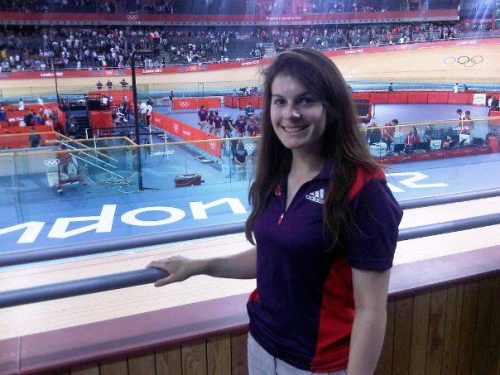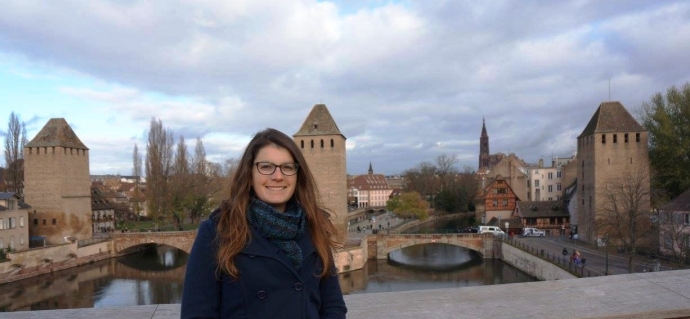In Strasbourg, France: Catherine Dunmore, LLM student at the Faculty of Law, is the first recipient of the Newton Rowell Fellowship
By Karen Gross
“Brilliant,” is how Catherine Dunmore describes U of T and the city of Toronto, after several weeks here pursuing her master’s in law. And yes, she is English, in case you were wondering. Dunmore grew up in the English countryside. She studied law at the University of Essex, from where she graduated near the top of her class. And she’s spent the past several years working as a lawyer in London and Paris.
“I’d thought for some time I’d like to return to my studies and I’ve always been interested in the field of human rights,” she says. “The University of Toronto gave me the ability to tailor the LLM course to fit my needs and interests, as opposed to taking a very formulaic course where everything is pre-selected for you.”
Just 28, Dunmore had already developed a varied and rich resume, volunteering countless hours at legal aid clinics and consulting pro bono on human rights cases. She worked with Oxfam Lawyers Against Poverty and was nominated for the Barreau de Paris Solidarité Junior Pro Bono prize last year. While doing all that, she completed post-graduate work at the London-based global law firm Freshfields Bruckhaus Deringer and practised international arbitration at Hogan Lovells in Paris, where she represented clients in English and French.

Volunteering at the London Olympics: LLM student Catherine Dunmore
With a background like that, it seems fitting that Dunmore became the inaugural recipient of the Newton Rowell Fellowship in Public International Law. The $500,000 endowed gift from the Hon. Hal Jackman is named for Jackman’s grandfather, the Hon. Newton Wesley Rowell, who served as Chief Justice of Ontario from 1936-1938. The fellowship awards Dunmore $20,000 towards her LLM studies, covering about half her expenses for the year.
“It’s a very generous and welcomed donation,” she says. “The University of Toronto was my first choice as essentially the best fit for what I wanted to study. But I don’t think it would have been possible for me to come without the support.”
Her coursework this term includes an international human rights clinic and a collaborative program with the Women’s and Gender Studies Institute. Next semester, she’ll be taking classes in international human rights law and international criminal law. After spending three months as an intern with the Public Defender’s office in Florida last summer, the death penalty is a topic of particular interest.
“For me, it’s the greatest human rights violation there could be. The government having the ability to take someone’s life away I think is a very strong breach of human rights,” she says. “Because we don’t have it in most of Europe and it’s not in Canada either, I find it interesting to explore the political side and ask why it’s still present in countries where it exists.”
Dunmore’s dissertation will examine post-conflict issues involving sexual and gender-based crimes committed against women. She’ll be looking at possible forms of reparation for victims and measures to ensure their ongoing safety.
As for where she’ll end up after the year is done, Dunmore isn’t sure. She may go back to Europe, possibly The Hague. “As an advocate, what I hope I can contribute most is helping to get people’s stories across, in the way they want them to be told,” she says.
Sounds brilliant.


